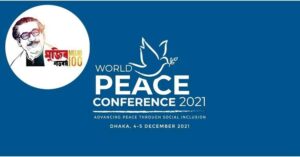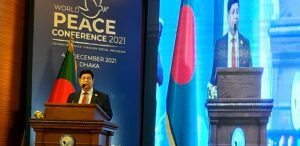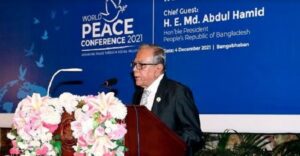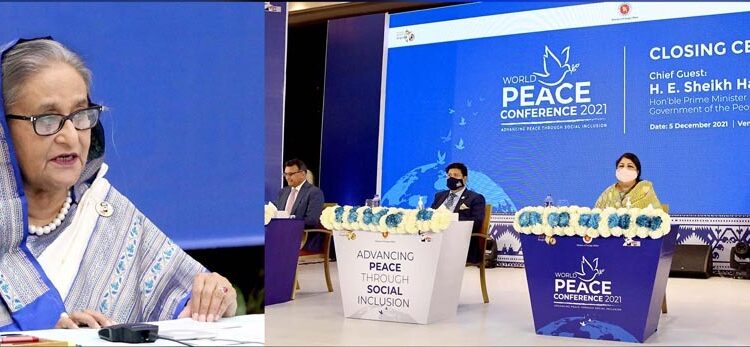Dhaka – The World Peace Conference 2021: Advancing Peace through Social Inclusion, wrapped up its meetings in Dhaka yesterday, stressing that social inclusion is a key factor for building back better, greener and stronger from the Covid-19 pandemic.
The two-day conference was concluded with the issuance of the Dhaka Declaration, which highlighted the role of peace in boosting development worldwide.
Prime Minister of Bangladesh Sheikh Hasina underlined the role of peace in socioeconomic development and GDP growth, citing her country’s success story in this regard.
“Bangladesh now is a role model in the world and socioeconomic development. We have received the SDG Progress Award. We have revolutionised electricity, communications, information technology and agriculture. The size of our economy is now $411 billion, per capita income is $2,554,” Sheikh Hasina, said.

“There is no alternative to build an accountable world order based on the partnership for living peacefully in this world. Bangladesh is always ready to work with all based on mutual respect and understanding to fully embrace the ideals of peace of Father of the Nation Bangobandhu Sheikh Mujibur Rahman,” she further said.
The Dhaka Declaration underscores that the UN 2030 Agenda for Sustainable Development remains a blueprint for economic recovery and inclusive growth in the aftermath of the pandemic.
“We must not relent on international peace diplomacy to put an end to armed conflicts that continue to cause mindless suffering to millions of men, women and children around the world,” it reads.
“We appreciate the backdrop for the Conference as Bangladesh observes the ‘Mujib Year’ to mark the 50h anniversary of its independence and the birth centenary of its founding father Bangabandhu Sheikh Mujibur Rahman.
“We recall that Bangladesh’s journey over the last five decades is a validation for people’s emancipation and empowerment as a pathway to sustaining peace, promoting sustainable development and upholding fundamental rights and freedoms,” it added.
Representatives from 50 countries took part in the conference. Some 59 participants from over 30 countries attended in person, and 40 guests virtually. Some of the guests sent video messages.
Bangladesh hosted the World Peace Conference as part of its celebrations of the Mujib Year, the birth centenary of the Father of the Nation Bangabandhu Sheikh Mujibur Rahman and the Golden Jubilee of the Independence of Bangladesh.
The conference aimed at delivering the message that peace has to be cherished in multifarious ways and that it will be sustainable only through social justice, equity and inclusiveness, the government of Bangladesh said in a statement ahead of the conference.

During the inaugural session of the “World Peace Conference 2021” on Saturday, Bangladesh Foreign Minister Dr AK Abdul Momen hoped there would be peace across the world, following an end to violence, war and terror with the active support from the international community.
“These activities and violence, whether against Rohingyas or Palestinians, are manmade ones. Since these are manmade, I’ve a dream: One day with your active Child and support, we can end violence, war and terror,” he told the event.
The speakers who participated in the conference talked about the Rohingya crisis, the Covid-19 pandemic, equal distribution of vaccines, shared concerns over new the Covid-19 variant and laid emphasis on equality and social inclusion.

For his part, President of Bangladesh M Abdul Hamid called upon all to shun the path of divisions, join hands and walk together on the path of peace as he opened the Conference, highlighting Bangladesh’s “untiring quest” for building a peaceful, just, rights-based, inclusive and prosperous nation.
“We cherish peace with great affection. And we are committed to attain, sustain, promote and strengthen peace at all costs,” he told the conference.
In line with the country’s constitutional obligations, Bangladesh believes that peace around the world is the best guarantee for national security and “we would continue our efforts to resolving conflicts through peaceful means and promote peace across the globe.”
Noting that now-a-days the world is facing with numerous challenges, like fatal Covid-19 pandemic and conflicts, Abdul Hamid said: “Unless we are united and ensure mutual peace and harmony, we will not be able to secure a safe and habitable world for our children and future generations which is already grappling with adverse effects of climate change.”
The head of the state called for ending discriminations based on race, faith, colour, religion and ethnicity, and ensuring equal opportunity for all.
Being a human being in a shared planet, Abdul Hamid said people have also shared responsibilities here and a fair international system is also essential for all the peoples of the world.
“We consider peace to be the crucial importance all over the world . … Maintenance of peace and harmony are essential elements of our life as peace guarantees freedom from violence or fear between individuals or groups,” he observed.
Terming the ‘World Peace Conference’ in Dhaka as a fitting tribute to all the peace-loving people in the world, the president said: “If we can do anything to promote peace anywhere in the world, we would be happy to render our services. We are for peace all the time and are so without any preconditions.”
Referring to the birth of Bangladesh before 50 years, he said the country emerged as an independent state by dint of supreme sacrifice of about three million people under the leadership of founding Father of the Nation Bangabandhu Sheikh Mujibur Rahman in this December in 1971.
Soon after the independence, Bangabandhu, a fervent advocate of peace, introduced a constitution that guarantees basic human rights of all its citizens, ensures promotion of international peace, security, and solidarity, he said, mentioning Bangladesh’s foreign policy “Friendship to all, malice towards none”.
As recognition of Bangabandhu’s contribution to establishing peace, President Hamid mentioned that the World Peace Council awarded Julio-Curie Peace Prize to Bangabandhu in 1973 for being a symbol of world peace.
“The Father of the Nation Bangabandhu (Friends of Bengal) turned into Bishwabandhu (Friends of the World),” Hamid mentioned.
The President said at the UN General Assembly in 1974, Bangabandhu Sheikh Mujibur Rahman outlined his vision for building peaceful, just and inclusive societies around the world and highlighted how global inequities and injustices are the real threats to international peace.
“Our total commitment to peace is born of the realisation that only an environment of peace would enable us to enjoy the hard-earned fruits of our national independence and to mobilise and concentrate all our energies and resources in combating the scourges of poverty, hunger, disease, illiteracy and unemployment,” he added.
At the outset of the speech, the President paid profound respect to the greatest Bangali of all time Father of the Nation Bangabandhu Sheikh Mujibur Rahman, four national leaders and valiant freedom fighters and foreign friends, who made their supreme sacrifice for the sake of the 1971 Liberation War and all other democratic movement.






Discussion about this post